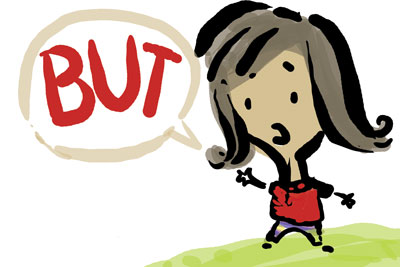
Listen to yourself as you’re speaking. You'll invariably find yourself saying the word “but” several times a day.
You'll use the word to nullify what you just said, as in: You did a great job, but… Or you'll use the word to defend your actions, as in: I would have done that, but…
My niece Marsha used “but” as a five year old would…
If she did something wrong, she defended her way out of it by saying the word “but”. What made it funny was the fact that she almost used the word “but” like a machine gun.
So a conversation would go like this: Marsha did you drop the coaster on the floor? “Yes, but, but, but, but, but,…” Marsha would say and instantly absolve herself of any responsibility.
It was never her fault.
She never wanted to say sorry.
She just learned to say “but” instead.
Till the day, she ran into Renuka (Miss Queen)
Renuka is called “Miss Queen” by Marsha. The Queen can do no wrong. What the Queen says, the “subjects” have to “accept”. Marsha even bows before the Queen.
Well, Miss Queen decreed that not only would Marsha have to stop saying “but”—she'd also have to pinch her own butt, every time she said the word “but”.
So there you have it, a five year old self-fixing the problem
Do five year old kids self-correct in a day? Well Marsha did. She didn't quite stop saying “but”. Yet she knew exactly when she said it. And because of the “royal decree” she would faithfully pinch her own butt, if she slipped up.
In less than a week, the word “but” had almost disappeared. And now almost eight months later (at the point of writing this article), Marsha almost never uses the word “but”. And if she does, you know what comes next.
And it doesn't stop there
Marsha's become a pinching machine. Her father, mother, uncles, aunts are all on the pinch list. If they slip up and say the word “but” there's Marsha flying across the room to pinch their butt (Grandma and Grandpa are exempt from the rule. And as you would expect the Queen has diplomatic powers too).
It's important learning for Marsha, and just as important for the rest of us.
1) You can stop being defensive. The word “but” is mostly defensive except in rare conditions. The more we take responsibility for our actions, the less we need the word “but”. And the fewer excuses we have in our lives.
2) You can start using the word “and” because the word “but” nullifies what you just said. e.g. “I did ten things on my to-do list, but I didn't do the remaining five things”. Instead you could say: “I did ten things and I have five more to go. ”
So the next time you find yourself saying “but” pull out your forefinger and thumb.
Reach for your butt, and tighten into a pinch. Do that a few times and you'll find that your butt is a good reminder to stop saying but.
And the best way to take responsibility for the rest of your life.
A life with no “buts”.

Yeah but, ‘but’ is a really handy word! 😉
But you can get rid of it.
Hi Sean
I really liked the post.
I reminded me of a post a read a few weeks ago about Fixed mindset and Growth mindset. And that post prompted me to read the book that the post was based on “Mindset The New Psychology of Success” by Carol S. Dweck.
The fixed mindset is always looking for affirmation that they are good enough and the growth mindset is always looking for ways to improve and get better.
A mistake is very mad for a fixed mindset person and shows that they are a failure.
A mistake for a growth mindset person shows that they have more learning to do. They use the failure as an opportunity for learning and growth.
The good news from the book is that you can change your mindset.
I have also been enjoying the Brain Alchemy material as well.
Jack